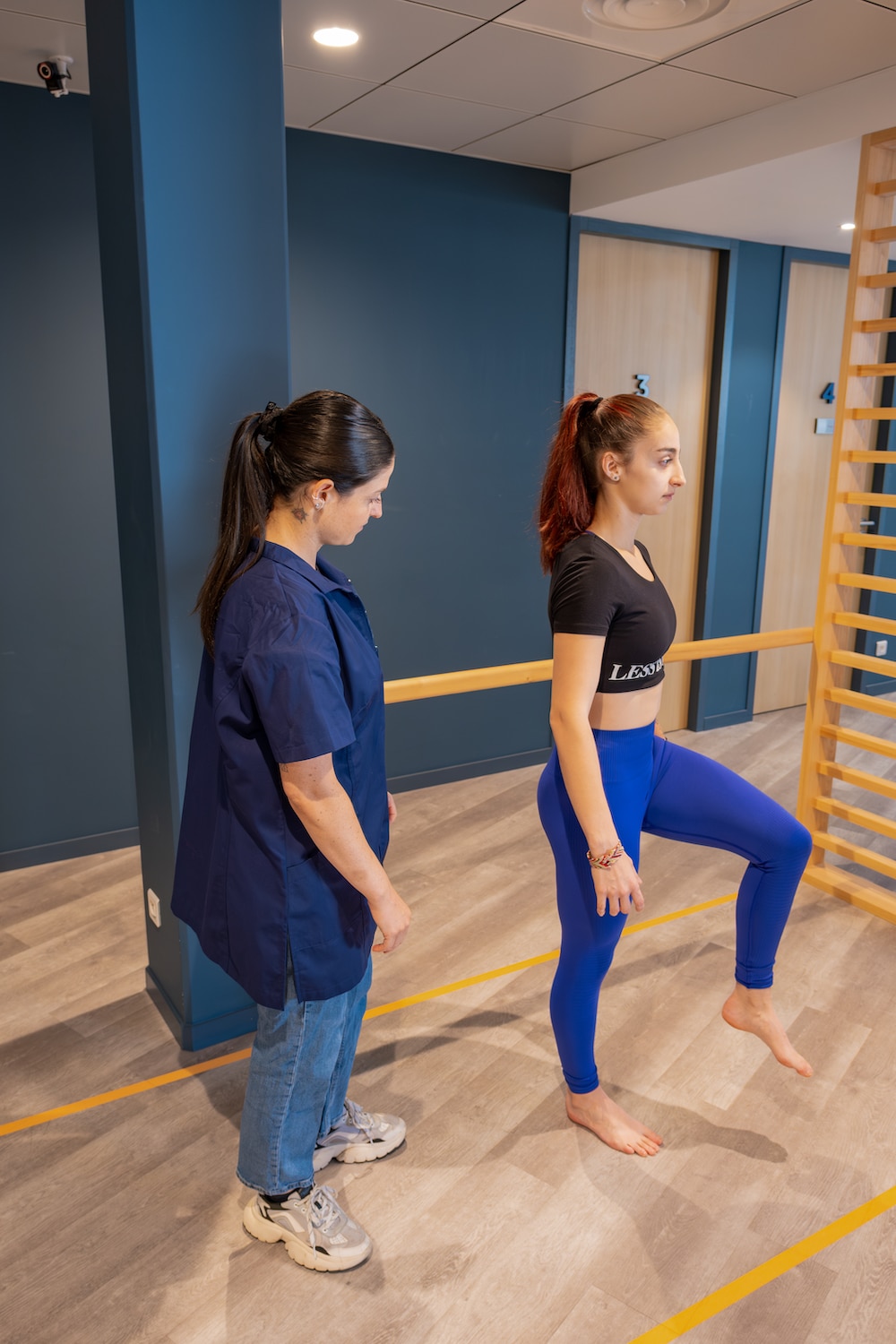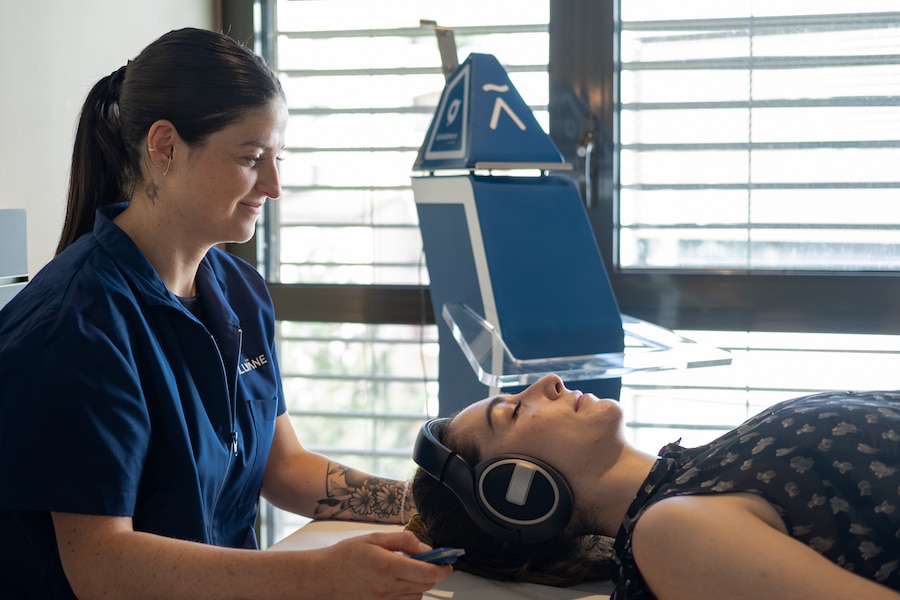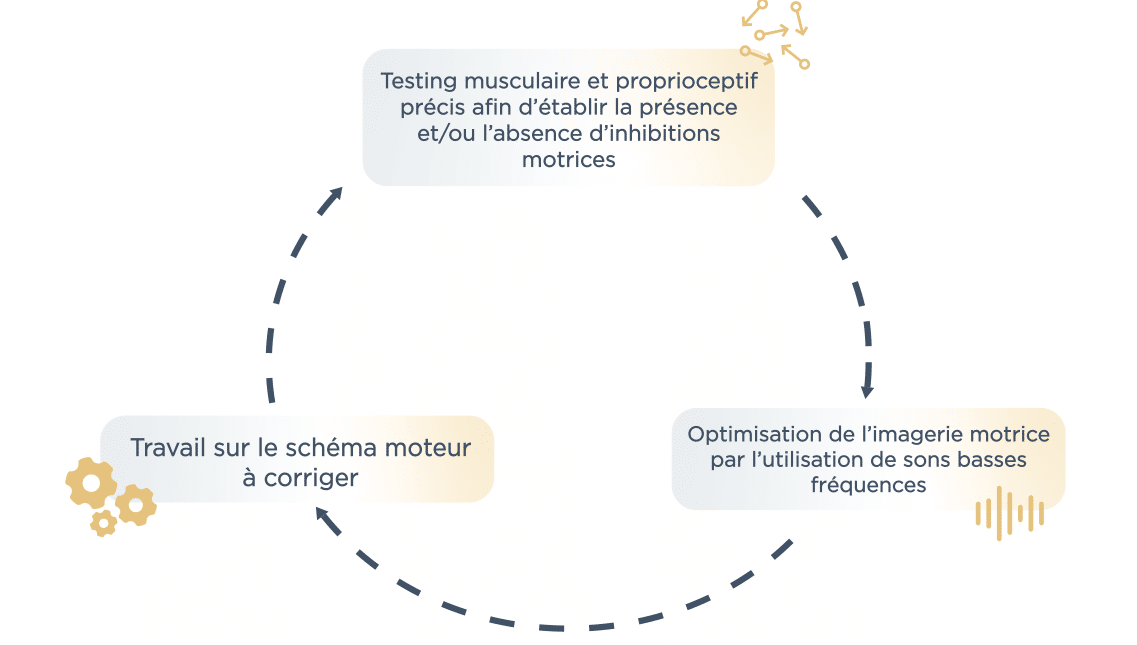Which patients should be prescribed an Allyane neuromotor reprogramming session?
Allyane neuromotor reprogramming accelerates a patient's return to mobility, in particular by helping to remove any pathological motor inhibitions that may delay the rehabilitation process.
Identify & rapidly treat pathological motor inhibitions
Allyane method
What are the benefits of the neuromotor reprogramming method Allyane?
The neuromotor reprogramming proposed by Allyane offers several important advantages.
It enables us to quickly identify and treat pathological motor inhibitions, reintroduce the patient's motor function, or remove blockages that may appear during the rehabilitation process.
Neuromotor reprogramming can also help the patient to defuse a non-functional gesture and limit the risk of recurrence.
Clinical studies
The benefits of the Allyane Method
A clinical study* presented at the ECOSEP sports medicine congress in November 2021, shows that an Allyane session notably enables:
- increase average muscle activity (measured by surface EMG**)
- de 41% statistiquement significative (p<0,001)
- de réduire un flessum de 9,01 degrés statistiquement significative (p<0,001)
Another study published in the scientific journal Sports Health shows an increase in activation of the Oblique Medial Vastus (+45% by EMG measurement***) after a 1-hour neuromotor reprogramming session for patients after knee sprain and/or ACL repair surgery.
This study highlights the clinical benefits of a 1-hour Allyane neuromotor reprogramming session, illustrating the need for multidisciplinary management following knee sprains and surgery.
* Case series, evidence level 4
** Average of three isometric contractions of the Medial Oblique Vastus
*** Dos Anjos T, Gabriel F, Vieira TD, Hopper GP, Sonnery-Cottet B. Neuromotor Treatment of Arthrogenic Muscle Inhibition After Knee Injury or Surgery. Sports Health. 2023;0(0). doi:10.1177/19417381231169285

Allyane method
Allyane neuromotor reprogramming method: What are the indications?
The Allyane neuromotor reprogramming method can be prescribed in a variety of situations. These sessions can, for example, be used in a post-operative setting (following ACL surgery, flessum, quadricipital sideration, etc.), to help the patient regain mobility and/or initial range of motion.
Neuromotor reprogramming can also be used to treat certain traumatic pathologies, such as knee or ankle sprains, post-dislocation shoulder instability, hip instability, or the after-effects of retractile capsulitis.
In the case of neurological disorders of central origin, the neuromotor rehabilitation offered by the Allyane method can also be used to treat certain pathologies (hemiplegia, post-stroke spasticity, MS).
It should be noted that the duration of sessions and treatment may vary according to the pathologies suffered by the patient in question. For traumatic pathologies such as cruciate ligament rupture, the healthcare professional can offer patients sessions lasting around an hour. For patients suffering from neurological damage, regular 2-hour sessions are generally recommended.
Post-operative: post ACL surgery, flessum, quadricipital sideration, PTH/PTG
Traumatic pathologies: ankle or knee sprains, post-dislocation shoulder instability, hip instability, sequelae of retractile capsulitis, etc.
Central neurological disorders: hemiplegia, post-stroke spasticity, MS
Session length & cost :
Traumatic pathologies such as cruciate ligament rupture: 1h - 1 session may be sufficient
Neurological damage: 2h - regular care
Allyane method
What are the contraindications?
Mechanical disorders
Impaired cognitive abilities
Child too young
Hyperalgesia
Peripheral neurological disorders
Please note: the Allyane method does not work directly on the painful sensation.
There may be certain contraindications to the prescription of a neuromotor reprogramming session.
This is particularly the case if the patient suffers from mechanical disorders, cognitive impairment, is too young, has hyperalgesia or peripheral neurological damage.
Allyane method
Strengthening the care pathway with the Allyane method
To solve the rehabilitation problems caused by pathological motor inhibition, Allyane offers an innovative approach based on a combination of proprioception, mental imagery and listening to low-frequency sounds emitted by a patented medical device.
The Allyane neuromotor re-education process induces a state of hypovigilance in the patient. The aim is to erase faulty motor patterns and re-establish correct motor patterns through mental imagery and proprioception.
Using the Allyane method as part of a care pathway is an additional asset for resolving blockages and delays in rehabilitation or recurrence, and ensuring that the patient can resume an effective care pathway.


